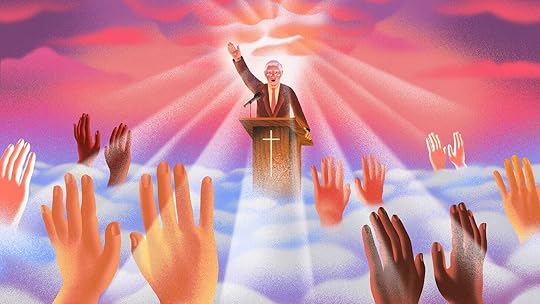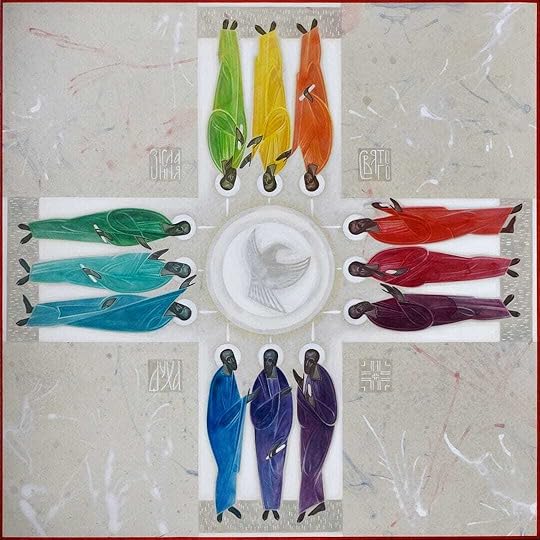How Do You Identify False Prophets?

Tamed Cynic is a reader-supported publication. To receive new posts and all content, consider becoming a paid subscriber.
True confession time.
I have a particular sadomasochistic kink.
I cannot keep myself from doom-scrolling rightwing, self-professed Christian “prophets” that appear to be the only people still active on Twitter. Chief among these social media soothsayers is “Pastor” Julie Green whose CV reports that she’s an associate minister at Faith Family Fellowship Church in Davenport, Iowa. Her social media channels, however, present her as a spirit-filled prophet anointed on behalf of The Former Guy.
I dare you.
Take a gander at some of Pastor Green’s abundant “prophecies.”1
If the fullness of time should show that Julie Green is indeed a prophet of the true God, then evidently Yahweh’s investment in Hunter Biden’s laptop exceeds his concern for the children Russia has stolen from Ukrainian mothers.
I take it as quite obvious that, at best, Green is worshipping an idol unawares and, at worst, she and her ilk are grifters and charlatans.
But— fret not, this the reason for the essay— here’s the question for Christians:
How do you assess that this self-styled prophet (and those like her) is a false one?
How do you discern that the spirit she cites as her ecstatic authorization is not the spirit that is holy— the only spirit that is the Spirit of the Father and the Son?
In his first epistle, John instructs the church not to believe every spirit, “but test the spirits to see whether they are from God.” The exhortation is a clear indication that there are more spirits at work in the world than the Holy Spirit. Again, though, how do you so test the spirits? How do disciples distinguish between the spirit of _______ and the Spirit that is the third person of the Triune God? Remarkably, the task is not at all difficult for scripture straightforwardly supplies the criterion for discerning true prophecy.
Before proceeding, it’s critical to point out that after Pentecost prophet is no longer an office occupied by individuals. To Jews, the sure surprise of Luke’s account of Shavuot in the Book of Acts is that the Spirit, who heretofore had descended only upon individual leaders of Israel (e.g., Moses, Jeremiah, David) fell upon the whole body of believers. Just so, the church herself now holds the office of prophet because the Spirit who lavished herself so gratuitously at Pentecost persists in pouring herself out on all believers in word, water, wine and bread. Post-Pentecost, prophecy in the spirit is a communal work rather than the endeavor of anointed individuals. Pentecost alone is enough to disqualify many pretenders to prophecy.

With that caveat, here’s the first scriptural criterion for discerning true prophecy from false utterance on behalf of barren deities:
1. True prophecy gospels.Clearer discernment of legitimate prophecy requires a sharper understanding of scripture’s teaching of the third person of the Trinity. In continuity with the Old Testament, the Spirit in the New Testament continues to be the breath of life who can raise the dead and— even— animate statues (Revelation 11.11 and 13.15). The Holy Spirit, in other words, is the “ontological opposite of death.”2 Christ dies by the flesh and so do we die, but by the Spirit we all rise. The New Testament, then, understands the Holy Spirit Christologically.
Citing Acts 17.1, Robert Jenson writes:
“The Risen Jesus has a spirit as only a living person does and this spirit of Jesus simply is the spirit of prophecy.”
Christian prophecy is quite simply Christ speaking to those who gather in his name. Whenever true prophecy appears, it is the Risen Christ who sends his Spirit to create it. This is the plain teaching of scripture:
“Being therefore exalted at the right hand of God, and having received from the Father the promise of the Holy Spirit, he has poured out this that you both see and hear.”
— Acts 2.33
The Risen Christ speaks by the Spirit not only in our present but in Israel’s past. As Peter makes clear in his first epistle, the Hebrew prophets themselves were inspired to prophesy by “the Spirit of Christ'“ (1.11). In other words, the spirit that fell upon Jeremiah was the Spirit of Jesus. John gives us the most dramatic example of this Christ-centered doctrine of prophetic inspiration in his Apocalypse:
“For the testimony of/about Jesus is the spirit of prophecy.”
— Revelation 19.10
Clearly, part of our difficulty distinguishing true prophets from false ones is our lack of eschatological nerve when it comes to the inconceivably high claims scripture makes about Christ. When the Word of the Lord comes to someone in the Old Testament, it comes not as a stream of speech. It comes us as Jesus. Just so with prophecy, past and present.
Consequently, if what you hear does not sound like the Friend of Sinners and Prince of Peace who, while they were yet his enemies, died for the ungodly, then it’s not true prophecy.
The Holy Spirit enables and energizes gospel.As gospel, prophecy is therefore always in the mode of promise.Not prediction. And certainly not in the register of fear.Correlatively, gospel-telling does not need to become something “more” to be spirit-filled:
Where the witness to Christ is, there is the Holy Spirit.
Where the Holy Spirit is, there is witness to Christ.
There is gospel.
There the future is offered not as a threat but as a promise.
 2. True prophecy edifies the body
2. True prophecy edifies the bodyA sure tell that so many self-styled prophets today are false ones is their unabashed focus not on the Risen Christ’s body but on America. This is contrary to how the New Testament understands the prophetic office. We can see this in two decisive steps Paul makes in his correspondence with the Corinthians.
First, Paul make ecstatic seizure but one gift of many gifts grouped under prophetic activity:
“To one is given through the Spirit the utterance of wisdom, and to another the utterance of knowledge according to the same Spirit, to another faith by the same Spirit, to another gifts of healing by the one Spirit, to another the working of miracles, to another prophecy, to another the discernment of spirits, to another various kinds of tongues, to another the interpretation of tongues. All these are activated by one and the same Spirit, who allots to each one individually just as the Spirit chooses.”
— 1 Corinthians 12.8-11
Importantly, Paul identifies a common attribute that qualifies all these prophetic gifts of the Spirit.
They are only true prophetic gifts of the Spirit if they edify the body of Christ.This edification has a proper end too— unity.“To each is given the manifestation of the Spirit for the common good.”
Paul makes it plain two chapters later:
“Those who prophesy speak to other people for their building up and encouragement and consolation. Those who speak in a tongue build up themselves, but those who prophesy build up the church.”
— 1 Corinthians 14.3
True prophecy gospels because it is the Spirit of Jesus who authorizes prophetic speech. The Risen Jesus so speaks to two inextricable ends, the building up of his body and the uniting of it under his name.
Hence, as Paul writes in Romans, the charism in the charisms is love (12.9); therefore, the ultimate manifestation of the Spirit’s prophetic gifts is not religious experience or charismatic utterance but “love, joy, peace, patience, kindness, goodness, faithfulness, gentleness, and self-control.”
By this standard, today’s self-styled prophets bear strange fruit indeed.
 Read Tamed Cynic in the Substack appAvailable for iOS and AndroidGet the app1
Read Tamed Cynic in the Substack appAvailable for iOS and AndroidGet the app1You can read more about her in my friend, Diana Butler Bass’s post:
2Robert Jenson
Jason Micheli's Blog
- Jason Micheli's profile
- 13 followers



